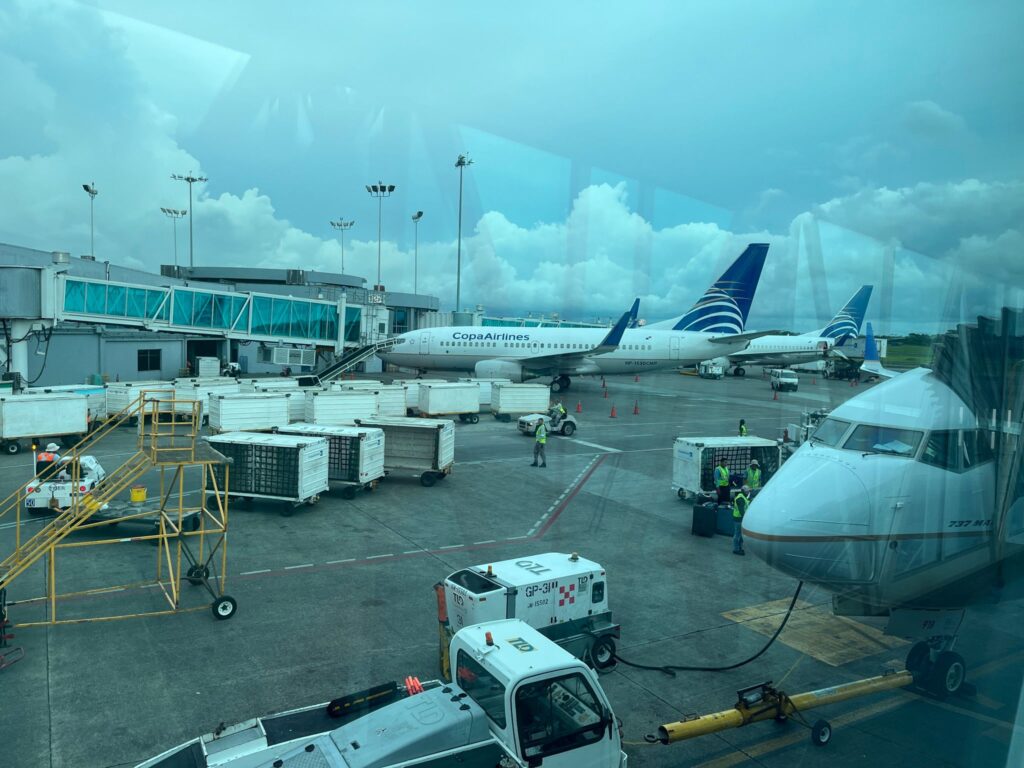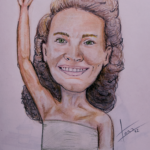The latex-gloved hands of the woman in uniform pass over my breasts, swollen from producing milk every day. “Turn around,” the woman told me. And her hands go back over my buttocks and between my legs. They treat me like a criminal. My “crime” was taking my son to the bathroom at the Panama airport. Absolutely outrageous and degrading, the inhuman treatment of immigration in Latin America and of Copa Airlines to its customers.
Everyone who travels knows it: check-in, immigration stamp, and security. Those who travel with children understand the hassle that results from putting the diaper bag, the backpack with toys, the stroller, the suitcase, and in our case, the camera equipment through the x-rays. It is difficult, to say the least, and it is so complicated that the fact that they allow us to go through a "special" line is not something to congratulate anyone on, it is a right.
We went through the usual security to enter the airport boarding areas and, to keep the baby hydrated and happy, we immediately bought snacks for the trip, accompanied by cans of coconut water and juice to watch movies with our son, the family's favorite plan.
Room 128 indicates the giant screen after passing through security. There is half an hour left before boarding, so we take precautions and get there with time, as everything always takes longer with a child and a baby.
The room is surrounded by a blue tape with the words Copa Airlines written in white letters, held together by metal tubes, and placed explicitly to force people to go through a second security filter exclusively for our flight. We are the first to arrive and they immediately tell us that we cannot bring in liquids, that they might make an exception because we are carrying a three-month-old baby. My companion and I look at each other, we already know what is coming.
Our son takes a few gulps of his juice, which goes almost all of it in the trash. We drink a coconut water among the adults standing in line in the living room, the second one stays in the bag.
At first I laugh at the absurdity of not allowing liquids, because I could easily leave my juices on the floor, "outside" the cordoned-off room, and drink them from "inside." My feet are inside the room and my head is in the hallway. The requirement is ridiculous, from the start.
"Miss, that water is not for the baby and you know it," the uniformed woman tells me with authority, holding the unopened can of water she had just bought, even though I told her I had a baby.
I really wanted to answer her: "How do you know what I'm giving my baby?"
How can they possibly demand that we lock ourselves in a room cordoned off by a cloth tape, with no liquids or bathrooms, for more than an hour to wait for boarding to begin and for our flight to depart?
"I have milk in my breasts, is she going to squeeze that out of me too?" I think.
The stupid excuse that they are flights to the United States, while the "güeros" from the north must laugh out loud at the tricks they make us Latin Americans go through. The backyard of the "big bully" who looks down with disdain, while the others kneel down to smile when they are treated as always: with the tip of the foot.
I only managed to say in passing that I was the one making milk and needed to hydrate, and that that should be important enough, but nobody cares. It is unfortunate that they try to tell us that the United States is the one who gives the orders. And if that were the case, it would be worse if the foreign ministers of Latin American countries and the airline personnel of those countries allow themselves to be trampled on.
First of all, because they somehow accept that the security of their airports is deficient. And, therefore, it is their duty to carry out a second review.

To continue, this type of inhuman treatment corresponds to a colonial logic reproduced in all spheres of Latin American societies, where those who are on top treat those “below” worse… by stepping on others, they make them somehow… better? They get on the brick and get dizzy, we say in my town.
We are already in the lounge ready to board, our spirits calm down after the degrading treatment and, suddenly, my son announces that he needs to go to the bathroom. That's what motherhood and fatherhood are like.
My son and I have to go to the bathroom through the improvised access set up in minutes by security guards who I don't know what Hollywood superheroes they think they are.
Blue tapes that I still don't know what they protect us from in the corridor at the takeoff terminal, but how they complicate our lives.
Upon returning from the bathroom, I again had to show my passport, ticket and take off my shoes. I had no jewelry, no watch, no wallet, nothing. A strict search because the sensor lights lit up. I had my passports in my hand and the uniformed woman, who dedicates her life to checking that the light is always green when people pass by, didn't think to tell me that it was the passports that possibly activated the sensor and preferred to touch me in front of my son and in public in my most intimate parts, while I kept my arms stretched out to the sides. Like a criminal.
When I got back to the lounge, I asked the Copa employee at the counter for a glass of water. “I don’t have any here. You have to wait for the plane,” the guy said with all the kindness of someone who is lying to you with a smile on their face.
My partner and I had already learned our lesson from flying for the Copa. The outward journey was no less terrible.
The first flight left at 1 a.m. on a Monday in August. Flying with children in the early hours of the morning is difficult, not only because their sacrilegious routine is disrupted, but also because you usually have to carry them and put up with bad moods or some madness caused by lack of sleep.
Fifteen minutes before the flight, we were informed that the departure was delayed. It was three hours before we were informed that the flight was definitely cancelled.
Two hundred people stranded at 4:00 a.m. at the San Francisco airport. Our checked bags were returned to us.
The only information they could give us was that the flight would leave the next day and that we had to return to the airport at 6:00 p.m. I confirmed this information in the morning by calling Copa, where they told me to follow the supposed instructions from the previous day.
We arrived at 5:30 p.m. at the airport only to find that the Copa counter was closed. No sign, no nothing.
We walked through the airport carrying a baby, a stroller, suitcases, backpacks and a six-year-old child by the hand. There was no one and nothing who could tell us anything about the flight.
We spoke to Information, and nothing.
We spoke to security, but there was no certainty about what to do with the suitcase.
They all referred us to the same white telephone attached to the wall which connected to the Copa switchboard. And, in turn, the agents at the white telephone instructed me to speak to someone at the airport since the movement there could not be resolved by telephone.
Finally, at 7:00 pm, two hours after arriving at the airport late, an hour before our flight was due to leave, we recognized a passenger from the night before whom we followed to find a newly opened Copa Airlines counter. All the other passengers looked as tired and fed up as we did, but no one dared to complain. For the few of us who do, the answer is the same: “download the app and request a refund for your Uber from yesterday and you can file your complaint.”
The process is bureaucratic, to say the least; inhumane is a closer description.
Copa Airlines thus joins our list of unpunished and arrogant airlines, with which we will never fly again.

Anna Lee Mraz.
Sociologist | Feminist | Writer
Twitter @AnnaLeeMraz Instagram @annaleemraz
You may be interested in: Returns




